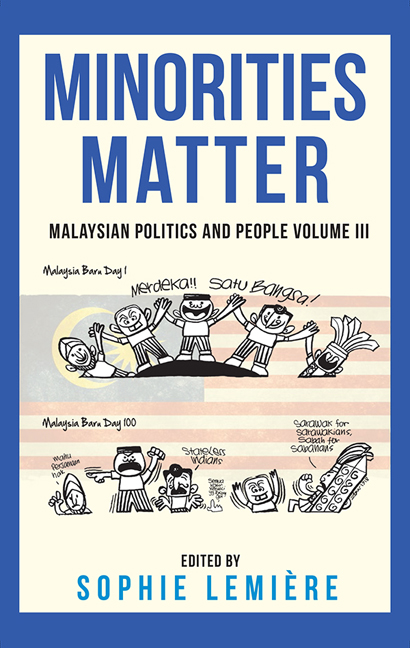Book contents
- Frontmatter
- Contents
- Acknowledgements
- Foreword
- Introduction
- Part I Engaging Politics: The Role of Minorities in GE14 and Beyond
- Part II Building Democracy: Malaysia Baru and the (Im-)possible Reform
- 6 Malaysia – A State of Sanctuary?
- 7 The Image of Laziness and the Malaysian Middle Class: Unpacking the Politics of Indolence
- 8 Poverty, Inequality and Youth Mental Health: Psychological Distress is Political
- 9 Competing Rights Talk and Pakatan Harapan's Incoherent Human Rights Agenda
- 10 The Court of the King of Hearts: The Long Failure of the Malaysian Judiciary – A Legal and Personal Perspective
- List of Contributors
10 - The Court of the King of Hearts: The Long Failure of the Malaysian Judiciary – A Legal and Personal Perspective
from Part II - Building Democracy: Malaysia Baru and the (Im-)possible Reform
Published online by Cambridge University Press: 25 January 2020
- Frontmatter
- Contents
- Acknowledgements
- Foreword
- Introduction
- Part I Engaging Politics: The Role of Minorities in GE14 and Beyond
- Part II Building Democracy: Malaysia Baru and the (Im-)possible Reform
- 6 Malaysia – A State of Sanctuary?
- 7 The Image of Laziness and the Malaysian Middle Class: Unpacking the Politics of Indolence
- 8 Poverty, Inequality and Youth Mental Health: Psychological Distress is Political
- 9 Competing Rights Talk and Pakatan Harapan's Incoherent Human Rights Agenda
- 10 The Court of the King of Hearts: The Long Failure of the Malaysian Judiciary – A Legal and Personal Perspective
- List of Contributors
Summary
‘Consider your verdict,’ the King said to the jury.
‘Not yet, not yet!’ The Rabbit hastily interrupted.
‘There's a great deal to come before that!’
Alice's Adventures in Wonderland (Carroll 1999)Introduction
A free and independent judiciary is the sine qua non of any properly functioning democracy. Montesquieu (1748) said:
When the legislative and executive powers are united in the same person, or in the same body of magistrates, there can be no liberty; because apprehensions may arise, lest the same monarch or senate should enact tyrannical laws, to execute them in a tyrannical manner. Again, there is no liberty if the judicial power be not separated from the legislative and executive.
In America, James Madison, who midwifed the American Constitution, said in the Federalist Papers (1788), ‘The accumulation of all powers, legislative, executive, and judiciary, in the same hands, whether of one, a few, or many, and whether hereditary, self-appointed, or elective, may justly be pronounced the very definition of tyranny.’ A judiciary servile to the executive – is that not the accumulation of all powers in the same hand?
The failure of the judiciary is ‘human, all too human’. Fear of the disapproval of superiors, ambition, prospects for advancement, all may play a part in the tendency of judicial decisions which consistently negate fundamental freedom. I have in my professional practice as an advocate found judicial officers in Malaysia generally pleasant and frequently regretful that politically motivated prosecutions are brought before them. But as a collective, the judiciary decided cases in a way that deprived citizens of their right of effectively protesting and questioning executive action.
I will show in this chapter that the above freedoms were rendered crippled and ineffective by the long line of illiberal judicial decisions – by a strange irony the very body created by the constitution to safeguard those freedoms became the means by which those freedoms were subverted, thus handing the people over to the tender mercies of an autocratic government.
The Ideal and the Actual in Judicial Practice
The reception of English law in Malaysia can be traced to the administration of Francis Light in Penang and thereafter in both Malacca and Singapore, the three regions collectively known as the Straits Settlements.
- Type
- Chapter
- Information
- Minorities MatterMalaysian Politics and People Volume III, pp. 164 - 178Publisher: ISEAS–Yusof Ishak InstitutePrint publication year: 2019



